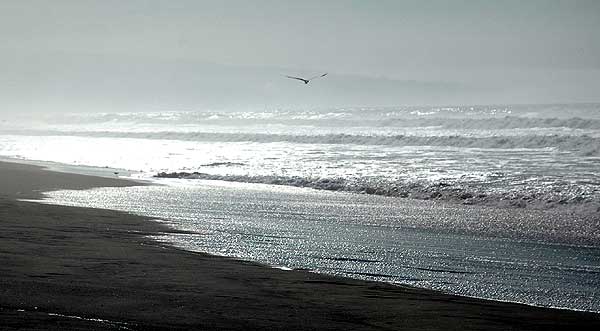Topic: Chasing the Zeitgeist
The Week the Year Ends
Okay, the Christmas holiday is over, and, like all other obscure writers on current events and the culture, the editor and columnists here at Just Above Sunset really ought to be working on the both the "looking back" columns (what just happened) and the looking forward columns (what seems to be going to happen). But everyone does that. There are a ton of those out there. One could build a column just by pointing to this one or that, and saying that one seems to make sense, this one doesn't, this is interesting and odd, and that is both wrong and dull. The object of such a column, of which you would find many here over the last three years, is to get a sense of the national dialog - in these pages called chasing the zeitgeist - a sort of "this is the American dialog" reporting.
On the other hand, often one writes just to get one's thoughts organized, not for an audience. The idea is not to plead some case or promulgate some particular point of view, but only to look at events and see if there's a way to make some sense of them. It's just, really, trying to figure out what's going on. If readers want to tag along for the ride, that's fine. But there are no promises. Some things just don't make sense. And some things do, and they are troubling.
Of course, not much happened over the Christmas holiday - congress had adjourned and the president was at Camp David, and the Monday after Christmas was a holiday. The markets were closed, no mail, no shouting matches and no hot accusations in Washington. The president then flew off to Crawford, Texas. Cindy Sheehan didn't follow him. The weekend "talking heads" shows - politics and spin - were mainly given over to year-end retrospectives.
Everyone agreed it was a bad year for the administration. Iraq didn't turn out so well - even with the elections. If only the Shiite-run court hadn't "disqualified" a few hundred Sunni candidates after the fact, saying they used to like Saddam Hussein or something (story here) so even if they won they couldn't take their seats in the new government. What are these Shiite guys, Republicans? And Hurricane Katrina came up - yeah, the president took four days to understand it was kind of serious, then said Michael Brown was doing a heck of a job, and then Brown resigned. Oops. There was the effort to dramatically change Social Security. That went nowhere. Folks would like to keep their guaranteed old age income, no matter how meager, that they actually paid for over all the years. The idea of playing the stock market as an alternative - and winning big, or not - just seemed stupid to most folks. The Harriet Miers nomination was an embarrassment. The vice president's Chief of Staff had to resign after being indicted on five felony counts. Some folks too brought up the Terry Schiavo business, where the president abruptly ended his vacation and flew back to Washington in the middle of the night to sign legislation to keep her body functioning. I guess it was supposed to be great symbolism for the "right to life" folks and embarrass the "moral relativists" on the left. All the polls showed almost all Americans saw this as just none of the federal government's business - people knew cynical grandstanding when they saw it, and the courts, even those with conservative judges appointed by the president or his father, refused to bend the law so the more-moral-than-you folks could win some points. And doesn't take a genius to understand a good number of folks in New Orleans might feel a tad resentful the president cut his vacation short for a midnight flight back to DC to keep the body of one brain-dead woman functioning but couldn't be bothered for four whole days to deal with thousands dying in New Orleans and on the Gulf Coast and a major city being destroyed. Well, he had other things to do, and at the time that Sheehan woman was out on the road by the ranch, causing trouble.
What else? The Post reveals our secret prison system where we disappear people, and the German fellow we picked up and on whom we used "enhanced interrogation" and held for seven months turns out to be a nobody, one of many mistakes, and in general our word is not trusted any longer. We do not torture, we do not kidnap people, and we do not "disappear" people forever with no explanation. We say we don't. But no one is buying. And in late December Italy issues an arrest warrant - actually an EU warrant - for twenty-two CIA guys who they say kidnapped a fellow off the streets of Milan who was never seen again, and we lied to them about it. Not good.
And news story after news story reveals the "intelligence" we used to justify the Iraq war was crap, and we knew it, but key people pushed it into the White House, bypassing those who evaluate such stuff for a living (we pay them to do that), and foreign governments who warned us the "intelligence" was bogus. How does the song go? What a fool believes, he sees? Oops. Sorry about the dead people.
So it was a bad year, and it ended badly, as in these summaries:
Associated Press - "The Republican-controlled Congress is staggering home for the holidays. Democrats, demoralized after last year's election losses, have a spring in their step after outmaneuvering President Bush and GOP congressional leaders in a series of session-ending clashes."
Washington Post - "After four years in which Congress repeatedly lay down while President Bush dictated his priorities, 2005 will go down as the year legislators stood up. This week's uprising against a four-year extension of the USA Patriot Act was the latest example of a new willingness by lawmakers in both parties to challenge Bush and his notions of expansive executive power ... Since this spring, Congress has forced Bush to scrap plans for a broad restructuring of Social Security, accept tighter restrictions on the treatment of detainees and rewrite his immigration plan. Lawmakers have rebuffed Bush's call to make permanent his first-term tax cuts and helped force the president to speak more candidly about setbacks in Iraq."
Los Angeles Times - "Since taking office, Bush has placed the highest priority on unifying his party behind an agenda of bold conservative change, even at the price of provoking intense resistance from Democrats and sharply polarizing the electorate ... In the past, that sort of brinksmanship has allowed Bush and the GOP to win big changes in policy with small legislative margins. That formula worked again this week when both chambers narrowly passed the budget-cutting legislation without a single Democratic vote. Yet the same strategy produced two stinging defeats for the GOP when Senate Democrats, helped by a handful of Republicans, held together for filibusters that blocked the Arctic drilling and the long-term renewal of the Patriot Act."
New York Times - "At nearly every crucial turn in recent weeks, it was a group of Republicans, painfully aware of President Bush's decline in popularity, who broke from the White House and the party leadership in the House and Senate and forced concessions in major legislation or stalled it until the bitter end."
Not a good end to not a good year (those four quotes were, by the way, assembled by Tim Grieve here). Sometime you can't win for losing.
The president won the last election. Kerry lost. So he had a mandate, and all that "political capital" he was going to spend. The problem is, of course, he misread the mandate. Pulling the lever for Bush and not Kerry was not saying everything the winner proposes on all issues is what you want. Everything is not, in spite of what the president would like to believe, so black and white. "More than half the people voted for me so more than half the people agree with anything I do, because they made their choice - and I won."
It doesn't work that way. It's just not that simple. Every issue was not settled once and for all in one election. Folks voted the way they did for all sorts of reasons, and one suspects that very few voted for "anything the man does at all is fine by me." You'd have to be a simple-minded fool to read it that way, or willfully simple-minded and not a complete fool, only self-deluded. But you can't call the president names like that, so maybe he just thinks everyone else is a simple-minded fool and will believe him if he keep saying his win means anything he does in the next four years is just what the majority wants, and that's the only thing the vote could mean - that is, he relies on the stupidity of the general population. So he keeps telling us just what the vote meant.
But that's not working either now. (For a good discussion of the "misread mandate" idea see Jay Cost here.) Some major initiatives have gone down in flames, although Republicans held firm and got their cuts in social programs - almost thirteen billion dollars cut from student loan programs over the next five years to keep the riff-raff out of college, cuts in Medicaid Medicare to teach folks personal responsibility, cuts in subsidies for heating oil for the poor, and cuts keeping a two or three hundred thousand more kids out of Head Start, along with cutting meals at schools for the poor. And they got credit card reform, raising payments, and a reform of the bankruptcy laws so no one without a good lawyer can hide behind those any more, and an array of deep tax cuts for those in earning big money. That's something. But the trend has been negative.
And the New Year does not promise to be better. The Fitzgerald probe into the CIA spy business will probably get Karl Rove indicted, perhaps even for destroying evidence (see this), and two legal-eagles on MSNBC on Monday, December 26th, were suggesting Cheney may be next after Rove. Yipes! Of course, Tom DeLay, the house leader, is now gone, under felony indictment, the senate leader, Bill Frist, is under investigation by the SEC and Justice over possible insider stock trades. Then there's Jack Abramoff, master Republican lobbyist, now working on a plea bargain to stay out of jail, and likely to give up six or eight Republican congressmen to save his butt, which would be the biggest corruption scandal in fifty or a hundred years (background here). There's a sea of troubles brewing. Who knows what these next few months will bring?
And bubbling along under all that is the really basic issue raised by the recent revelation that the president ordered the National Security Agency (NSA) to do domestic spying, previously forbidden, on Americans, which would require probable cause and a warrant, without any warrants or any judicial review. It was okay because although it was against the law, the law didn't apply to him. No wonder the story broke. Someone was sure to go to the press and say they were being asked to break the law on the president's word alone, and that just didn't seem right at all.
You see that battle brewing here. The New York Times broke this story and, as mentioned last week, Jonathan Alter in Newsweek broke this - "I learned this week that on December 6, Bush summoned Times publisher Arthur Sulzberger and executive editor Bill Keller to the Oval Office in a futile attempt to talk them out of running the story. The Times will not comment on the meeting, but one can only imagine the president's desperation."
Keeping a lid on such things is hard, and Monday, December 26th, the Washington Post says the same thing happened with them - White House officials, including John Negroponte and Porter Goss, met with Executive Publisher Leonard Downie and made a similar request concerning Dana Priest's article on secret CIA prisons. Leonard Downie isn't taking but others are -
Hey, what good is a democracy if you cannot muzzle the press? Or something... We live in very odd times."When senior administration officials raised national security questions about details in Dana's story during her reporting, at their request we met with them on more than one occasion," Downie says. "The meetings were off the record for the purpose of discussing national security issues in her story." At least one of the meetings involved John Negroponte, the director of national intelligence, and CIA Director Porter Goss, the sources said.
As reviewed last week here, the NSA domestic spying is an odd business. The president has pretty much said he's flat-out breaking the law, and will keep on doing it, because either 1.) the congress, when they approved him to use "appropriate force" to go after the terrorists and those who supported the terrorists, implicitly approved him breaking any laws that got in his way, even laws the congress had passed, or 2.) the constitution gives him, in times of war (even if one hasn't been officially declared here), broad authority to do anything necessary, so whatever congress or any law says just doesn't matter.
Couple that with concerted efforts to keep the press quiet, and you get something very odd. Even Chicago Tribune columnist Steve Chapman, a very conservative fellow for the most part, is a bit unnerved by all this - "To call this an imperial presidency is unfair to emperors."
Everyone is quoting his Christmas weekend column (here) -
And the middle of this item reviews many of the high-handed administration tactics, but the end is reserved for the NSA business -President Bush is a bundle of paradoxes. He thinks the scope of the federal government should be limited but the powers of the president should not. He wants judges to interpret the Constitution as the framers did, but doesn't think he should be constrained by their intentions.
He attacked Al Gore for trusting government instead of the people, but he insists anyone who wants to defeat terrorism must put absolute faith in the man at the helm of government.
His conservative allies say Bush is acting to uphold the essential prerogatives of his office. Vice President Cheney says the administration's secret eavesdropping program is justified because "I believe in a strong, robust executive authority, and I think that the world we live in demands it."
But the theory boils down to a consistent and self-serving formula: What's good for George W. Bush is good for America, and anything that weakens his power weakens the nation. To call this an imperial presidency is unfair to emperors.
This sort of stuff from the conservative side cannot be good. This coming year is going to be rough. The administration back down, or we get martial law? This middle ground is making folks very uncomfortable.The disclosure that the president authorized secret and probably illegal monitoring of communications between people in the United States and people overseas again raises the question: Why?
The government easily could have gotten search warrants to conduct electronic surveillance of anyone with the slightest possible connection to terrorists. The court that handles such requests hardly ever refuses. But Bush bridles at the notion that the president should ever have to ask permission of anyone.
He claims he can ignore the law because Congress granted permission when it authorized him to use force against Al Qaeda. But we know that can't be true. Atty. Gen. Alberto Gonzales says the administration didn't ask for a revision of the law to give the president explicit power to order such wiretaps because Congress - a Republican Congress, mind you - wouldn't have agreed. So the administration decided: Who needs Congress?
What we have now is not a robust executive but a reckless one. At times like this, it's apparent that Cheney and Bush want more power not because they need it to protect the nation, but because they want more power. Another paradox: In their conduct of the war on terror, they expect our trust, but they can't be bothered to earn it.
And the plot thickens - because maybe the government could NOT easily have gotten search warrants to conduct electronic surveillance of anyone with the slightest possible connection to terrorists. As reported many places, like in the Los Angeles Times on Christmas Day here, this isn't exactly wiretapping we're talking about here. Cryptography expert Bruce Schneier - "It's really obvious to me that it's a look-at-everything type program." -
Sure there is. The previous law may be moot -One former senior Pentagon official who has overseen such "data mining" said he also believed the NSA was probably conducting such wholesale surveillance.
"It's a reasonable hypothesis," the official said, adding that he believed it was necessary against savvy terrorists who would otherwise remain undetected.
One former NSA signals-intelligence analyst, Russell D. Tice, said the agency has long had such ability.
"I'm not allowed to say one way or another what the NSA is or is not doing. But the technology exists," said Tice, who left the NSA this year.
"Say Aunt Molly in Oklahoma calls her niece at an Army base in Germany and says, 'Isn't it horrible about those terrorists and Sept. 11?' " Tice said: That conversation would not only be captured by NSA satellites listening in on Germany - which is legal - but flagged and listened to by NSA analysts and possibly transcribed for further investigation.
"All you would have to do is move the vacuum cleaner a little to the left and begin sucking up the other end of that conversation," Tice said. "You move it a little more and you could be picking up everything people are saying from California to New York."
In interviews, current and former intelligence officials said communications technology was so advanced that it would probably be next to impossible for the NSA to filter out all of the U.S.-based electronic communications even if it wanted to when casting a wide net for terrorists
Some administration critics in Congress have begun speculating that the administration is specifically directing the NSA to conduct such surveillance on people in the U.S.
"Based on how much their story keeps changing, I think there's more to the story", said Susan McCue, chief of staff to Senate Minority Leader Harry Reid (D-Nev.). "A lot of people on Capitol Hill think that."
Or they could ask the law be changed. But they said they wouldn't ask. They'd have to reveal too much, like this (NY Times) - "The volume of information harvested from telecommunication data and voice networks, without court-approved warrants, is much larger than the White House has acknowledged, the officials said. It was collected by tapping directly into some of the American telecommunication system's main arteries, they said."Because data mining entails tracing potentially millions of innocent links to find a few suspicious ones, authorities would immediately encounter problems establishing probable cause to proceed. Then, the experts say, authorities would have to obtain warrants under the surveillance act for vast numbers of phone numbers and e-mail addresses.
According to this in the Boston Globe we're talking two million pieces of communications an hour. We've been doing it overseas for years. Doing it here is new. Here we're protected by the Fourth Amendment -
Have we outgrown that one? Shall we toss it out?The right of the people to be secure in their persons, houses, papers, and effects, against unreasonable searches and seizures, shall not be violated, and no warrants shall issue, but upon probable cause, supported by oath or affirmation, and particularly describing the place to be searched, and the persons or things to be seized.
If you've made a phone call overseas, or received one, if you've sent an email overseas, or received one, since September 2001, should you assume it's been opened, read, and recorded by the government? Maybe not the middle assumption - not read - although it has been scanned for patterns.
And maybe this is protecting us. But do we get to discuss it?
Should we amend the Constitution to allow this, or just trust the administration that this is necessary and limited, and they didn't use the intercepts to check up on John Kerry last election cycle, or to get a sense of what was in Patrick Fitzgerald's' office emails, or anything like that. Surely they'd not do that.
In any event, as tough is the last year was for the president and the administration the next year looks to be just as difficult. This year they have a bigger and far more basic task - to sell the "trust us, you don't want to know, you have no right to know, don't argue" imperial presidency. And they have the core thirty-five to forty percent who are fine with this. Let's see how they pitch this to the middle-of-the-road swing voters, and see who goes to jail, and what kind of government we get in Iraq, and all the rest.
It'll be an interesting year.
Posted by Alan at 22:00 PST
|
Post Comment |
Permalink
Updated: Tuesday, 27 December 2005 06:32 PST
home






